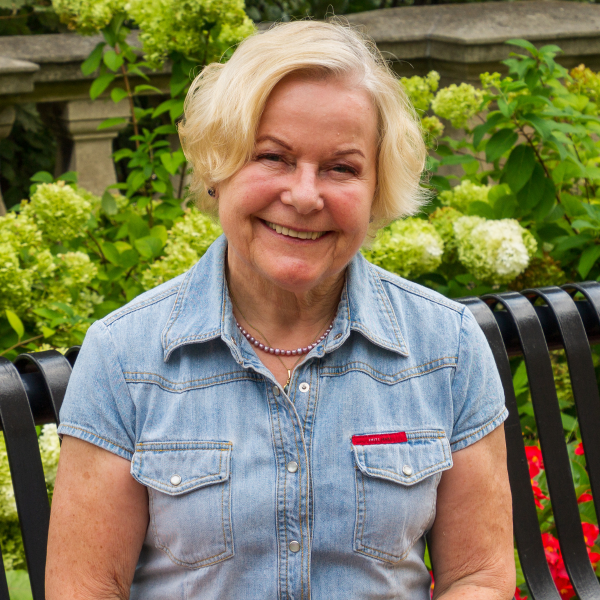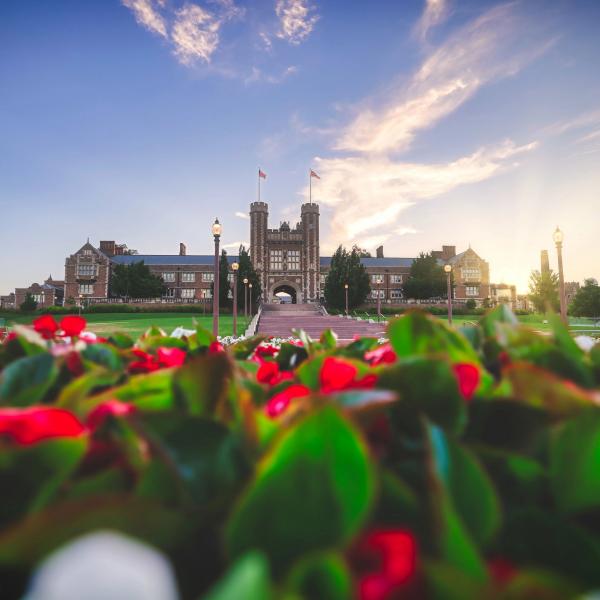Jim McLeod, Vice Chancellor for Students and Dean of the College of Arts & Sciences, died on September 6, 2011, after a two-year battle with cancer. McLeod had been a part of the Washington University community for more than thirty years. He joined the faculty in 1974 as an Assistant Professor of German and Assistant Dean of the Graduate School of Arts & Sciences. In later years, he held various administrative positions, including assistant to then Chancellor William H. Danforth (1977-1987) and director of African and African-American Studies Program (1987-1992).
Please click here to read the obituary, published in the Record on September 7, 2011. A memorial service will be held on October 9, 2011, at 1:30pm in the Athletic Complex.
Here are how different members of the German Department remember their colleague, mentor, and friend Jim McLeod: Egon Schwarz | James Poag | Paul Michael Lützeler | Gerhild Williams | Lynne Tatlock | Lutz Koepnick | Erin McGlothlin
Egon Schwarz
Without memory we would not have a past. Without a past we would not be human.
Jim McLeod’s death is a great loss not only for his family and the university but also particularly for the German Department where he began his career.
His extraordinary qualities are being extolled everywhere nowadays. While wholeheartedly agreeing with these paeans, I prefer in this context to recall the circumstances of his arrival here and to end with an anecdote he himself told me.
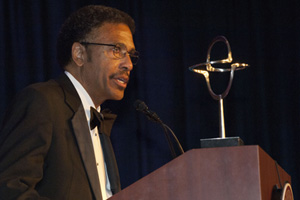 One day many years ago the administration of Wash U sent around to all department a request for the nomination of an individual who could help recruit minority students to the university as a half time faculty member. The other half would go to the successful department.
One day many years ago the administration of Wash U sent around to all department a request for the nomination of an individual who could help recruit minority students to the university as a half time faculty member. The other half would go to the successful department.
Fortunately, Jim Poag knew such a person from his time at Indiana University: Jim McLeod. It speaks for both Jims that the deal could be concluded, Jim Poag for his acumen and Jim McLeod for his ability to impress people.
Arrangements were made, Jim McLeod came to St. Louis and joined the Graduate School of Washington University as a recruiter. His successes and his spectacular rise in the administration where he was entrusted with one important responsibility after another is well known.
For the German Department it was of special significance that he joined us as a colleague teaching German as a language and a culture for many years, until his activities outside of the department grew to such proportions that he had to stop teaching with us, regretfully as he assured us. I use the word “German” here as a linguistic term because Jim’s primary interest and expertise was in things Austrian. It was ill-advised that he had been assigned too broad and too difficult a topic for his PhD dissertation, the phenomenon of the masses as perceived in contemporary literature. Perhaps an older scholar at the end of a long life of research could have handled such a complex interdisciplinary subject. Jim McLeod valiantly struggled with it for years but in the end, under the pressure of his many professional burdens, had to resign. Let me add the observation that a black person studying academic German in this country is a rare specimen indeed. How did a young black fellow from the south get into this unlikely field?
We all know that Jim attended Morehouse College, an elite institution for the black community. One of the advantages the students had was a year abroad. Jim went to Vienna where he immersed himself in the life of the city, its language and culture; so much so that at the end of his stay, on his return to Atlanta, he requested of the president of Morehouse, who was at first unsympathetic, then reluctant and finally convinced, a one-year extension of his stint in Vienna, and back he went.
This is how, unlikely as it was, he became a member of the German Department, our well-liked colleague and one of the most revered persons in the history of our whole institution.
Jim Poag
When he came to Washington University a few years after I did, Jim McLeod became an extremely important member of the German department. We were involved at that time in revising the undergraduate curriculum and the teacher training program. Throughout this process his advice was invaluable. He showed the imagination for concretely realizing academic goals while enabling individuals to contribute their special talents to the project. This was something that would characterize his later years as Assistant to the Chancellor and Dean of the College. He was a very talented and intelligent person. At meetings he would listen attentively and when asked for a comment, could always sum matters up and point to possible solutions, no matter how difficult or convoluted the discussion had became. He had a genius for leadership and achieved an enormous amount over the years but he was humble and understated through it all and invariably gave understand that it was others who had achieved the success. He was always fully there for anyone he was with. I remember him for his compassion, his gentle sense of humor, his generosity, and his expressions of friendship and support. I have so many wonderful memories of Jim, not the least those pool games in the late afternoon at Whittemore House when the place still had a pool table. We would talk about many things--whether personal or difficult issues at the university. Jim always put everything in perspective and he gave great counsel when it was needed. I must confess, in all the times we played I never once beat him.
Jim insisted this was because of his misspent youth. I cannot imagine Jim misspending any part of his life. One of his nephews said in a tribute given at a birthday party. “Uncle James was a great man." Indeed, he was.
Paul Michael Lützeler
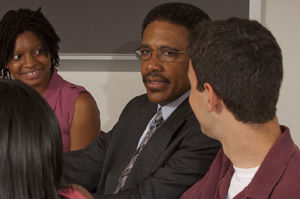 I met Jim when I was a visiting assistant professor at Indiana University in 1972-73 and when he was an instructor there. What he was best known for at the time was his humor and his good spirits, and I remember him in groups in which he often had a funny story to tell--yet never at the cost of other people. The following year I went to WU, and another year later Jim McLeod--with the help of Jim Poag--came to WU: both as a member of the German Department and as an Assistant to the Dean of the Graduate School. In the forty years I have known Jim, he was one of the colleagues you could always go to for advice. He genuinely enjoyed giving good advice, and with this attitude he had quite an impact on the morale of the Department and the university in general. He also was one of the greatest academic diplomats I have met in my lifetime. In 1980 I ran a symposium with him together (on Goethe's Erzaehlwerk), and it was a pleasure to plan and run the conference with him. Integrity and reliability were the two virtues of his that stood out: One of the quiet colleagues and administrators, with an great aura and a lasting impact. Although he was permanently involved in administrative matters he found time for things related to the German Department: opening, for example, German Day for some 30 years, or taking over moderator roles during a symposium (like last year's). I also was lucky enough to serve on the College Curriculum Committee for three years, and time and again we profited from his experience and wisdom. A great loss indeed: of a great human being and a good colleague. Thinking of Jim McLeod makes one a better person.
I met Jim when I was a visiting assistant professor at Indiana University in 1972-73 and when he was an instructor there. What he was best known for at the time was his humor and his good spirits, and I remember him in groups in which he often had a funny story to tell--yet never at the cost of other people. The following year I went to WU, and another year later Jim McLeod--with the help of Jim Poag--came to WU: both as a member of the German Department and as an Assistant to the Dean of the Graduate School. In the forty years I have known Jim, he was one of the colleagues you could always go to for advice. He genuinely enjoyed giving good advice, and with this attitude he had quite an impact on the morale of the Department and the university in general. He also was one of the greatest academic diplomats I have met in my lifetime. In 1980 I ran a symposium with him together (on Goethe's Erzaehlwerk), and it was a pleasure to plan and run the conference with him. Integrity and reliability were the two virtues of his that stood out: One of the quiet colleagues and administrators, with an great aura and a lasting impact. Although he was permanently involved in administrative matters he found time for things related to the German Department: opening, for example, German Day for some 30 years, or taking over moderator roles during a symposium (like last year's). I also was lucky enough to serve on the College Curriculum Committee for three years, and time and again we profited from his experience and wisdom. A great loss indeed: of a great human being and a good colleague. Thinking of Jim McLeod makes one a better person.
Gerhild Williams
Jim was about as perfect a person I have ever known, and each one of us who was privileged to be his friend and colleague became a little bit more perfect in his company!
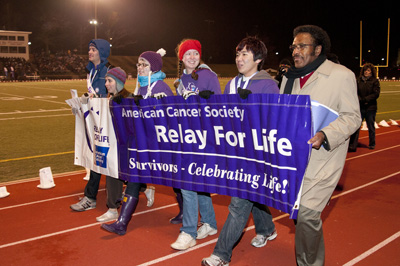 His mind went a mile a minute, he had more ideas in a day than most people have in a life time. Moreover, along with the ideas he always was able to figure out the appropriate approaches to get those ideas realized. Still, he never took credit for any of his accomplishments and for the visions that he, completely self-effacing, handed to others to execute. He was the most modest man in this and many other respects. His closeness to the German Department never diminished, even after he had to stop teaching because of his busy schedule. Most of us, certainly as chairs, regularly sought his counsel.
His mind went a mile a minute, he had more ideas in a day than most people have in a life time. Moreover, along with the ideas he always was able to figure out the appropriate approaches to get those ideas realized. Still, he never took credit for any of his accomplishments and for the visions that he, completely self-effacing, handed to others to execute. He was the most modest man in this and many other respects. His closeness to the German Department never diminished, even after he had to stop teaching because of his busy schedule. Most of us, certainly as chairs, regularly sought his counsel.
He was a friend to me and my family, especially to my daughter Verena whom he knew since we arrived here when she was 11 years old. I still have pictures he took of her because in those early days he never was without his camera, always taking pictures. I remember, when we were both assistant professors, how he used to describe so many things that later would come to fruition, for us and for the whole institution. And most of them he accomplished once he had moved on to the dean and vice chancellorship: the South Forty, UG Research, my work with him on the Undergraduate Council, the DUC, and many, many more.
And we had a lot of fun: We checked out and purchased the first computer for Egon on one of his birthdays (in those days, I had no idea what I was looking at!)
For the same birthday, he was instrumental in arranging a Liederabend which became a great success for many years for the whole university community.
He was instrumental in designing our first and subsequent graduate brochures (and responsible for it not showing Gothic script and flags!!!)
He thought of and planned the first FL Days which were to become German Days; and none of us ever tired of listening to him when he opened our German Day celebration in the Chapel.
Special is what he was, to each of us in our own way, and to all of us as a community. That he will be missed is a gross understatement!! As I told my daughter Verena, I am seeing him sitting up there on a nice big cloud chuckling and maybe worrying just a little bit about us as we try to carry on without him!
Lynne Tatlock
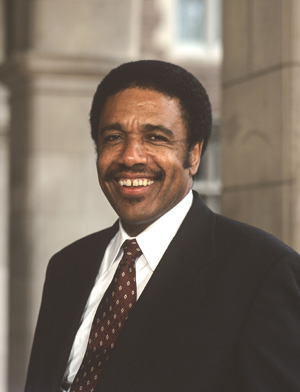 As I have come to understand ever more clearly during the last decade, we owe much of what we have become here at Washington University to the vision and resolve of our beloved colleague and friend Jim McLeod. Jim cared deeply about education. When he saw that we cared too, he fostered our every good impulse.
As I have come to understand ever more clearly during the last decade, we owe much of what we have become here at Washington University to the vision and resolve of our beloved colleague and friend Jim McLeod. Jim cared deeply about education. When he saw that we cared too, he fostered our every good impulse.
Jim provided comfort and wisdom. He helped us to gain perspective. Over the years, Jim several times saw me mad enough to spit nails, tears of fury rolling down my face. Jim could deal with such tears and such anger. He could acknowledge them, even signal to you that you were right. But he would not let you linger there; instead he helped you to a sovereign view. He more than once told me that, to gain good ends, he had learned to take his time. I wish he’d had more of it.>
Lutz Koepnick
I inherited Jim’s old office in the German department when I moved from the fourth to the third floor of Ridgley Hall in 2000. It was difficult to believe my eyes when I first opened the office door. Countless books, journals, and brochures were piled up in various stacks across the entire floor; papers spilled dangerously from different bookcases; not one square or even cubic inch appeared empty. Though Jim hadn’t used the office for a while, its labyrinthine structure certainly lived up to a Hollywood director’s most stereotypical image of professorial life. I can’t pretend I understood, or was eager to understand, whether there was a system behind the mess. For me, however, Jim’s use of office space was always emblematic for his role at Washington University. Jim won people’s minds and hearts because he considered face-to-face interaction—not the language of strategic plans, the deadening authority of statistics and numbers, or the lure of lofty arguments—as the principal pathway into the future. Jim was a man of incredible warmth, grace, openness, and humanity. He never hid behind his stacks of books and papers, but rather used them as a proscenium to do what mattered most: to engage personally with each and every student, mentee, and colleague. Not one person’s story and experience was ever of less importance for him than another’s.
Two years ago I moved with my family into Danforth House on the South Forty to participate in Residential Life’s Faculty Fellow Program. The program started more than ten years ago. It was largely driven by Jim’s visions of integrating the residential and academic aspect of campus life—and hence transforming Washington University into a true site of what we call Bildung in German, a site at which learning and open-ended individual growth go hand in hand. Jim’s signatures are all over the South Forty today. He has taught hundreds and thousands of undergraduates that their life as students does not end at the seminar door. He has inspired us to take time amid our busy schedules to have a good conversation, to reach out to each other, to make and sustain contact, to allow different stories to intersect with and support each other. His generosity and kindness will be as sorely missed on this end of campus life as on the other. There were no towering stacks of books and papers when we moved into our Danforth apartment in 2009. But whatever we do here in our or role as faculty fellows during the final two years of our residency will be done in honor of Jim’s memory—his unconditional and exemplary belief in the power of individual learning, personal growth, and communal interaction.
Erin McGlothlin
When I try to explain to outsiders to Washington University what Jim’s role here was, I say simply that he was the beating heart of this university. It’s an image that perfectly captures what Jim was to us, the faculty of WU, and our students. He pumped the lifeblood into this university, allowing it to thrive and excel in its educational mission. As a Faculty Fellow living on the South Forty, I encounter daily the results of Jim’s far-reaching and incredibly innovative vision for the undergraduate experience here. It is rewarding for me to be able to live out his dream of how students and faculty should interact on both an academic and a personal level.
Jim has also been a role model for me for how to deal with difficult situations involving other members of the WU community, whether students or colleagues. Several years ago, when I was a newly-hired assistant professor, I experienced a stressful and confusing situation with a very young and inexperienced student that involved issues of academic integrity. I was amazed about how Jim dealt with the situation; in his solution to the problem, which could easily have escalated into a full-blown conflict, he demonstrated a quiet authority, an unwavering sense of integrity, and a gentle kindness to all parties involved. He not only supported me, a nervous untenured faculty member, but he also gave the student, who understandably acted out in his frightened state, the full measure of his support, even as he made clear that he would not tolerate any violation of academic integrity. In fact, Jim’s adept handling of the situation allowed the student the opportunity to “back down” from his untenable position and to take a more reasonable path. The student eventually apologized to me for the situation and became one of our most successful and enthusiastic majors. I recently looked at an email Jim sent to me after I had expressed gratitude for his support. In his response, he wrote simply, “We are here to help you.” That short statement said it all; Jim was so humble that he never asserted an “I” when he could use the collective “we,” and his philosophy about his own role in furthering the education of our students could not be expressed more succinctly or eloquently.
I feel so fortunate to have known Jim and to have observed his intelligence, courage, kindness, openhearted warmth, and considerable administrative skill. I hope that I am a better educator for having known him. I know that all of us have our work cut out in fulfilling his vision and doing justice to his legacy.



